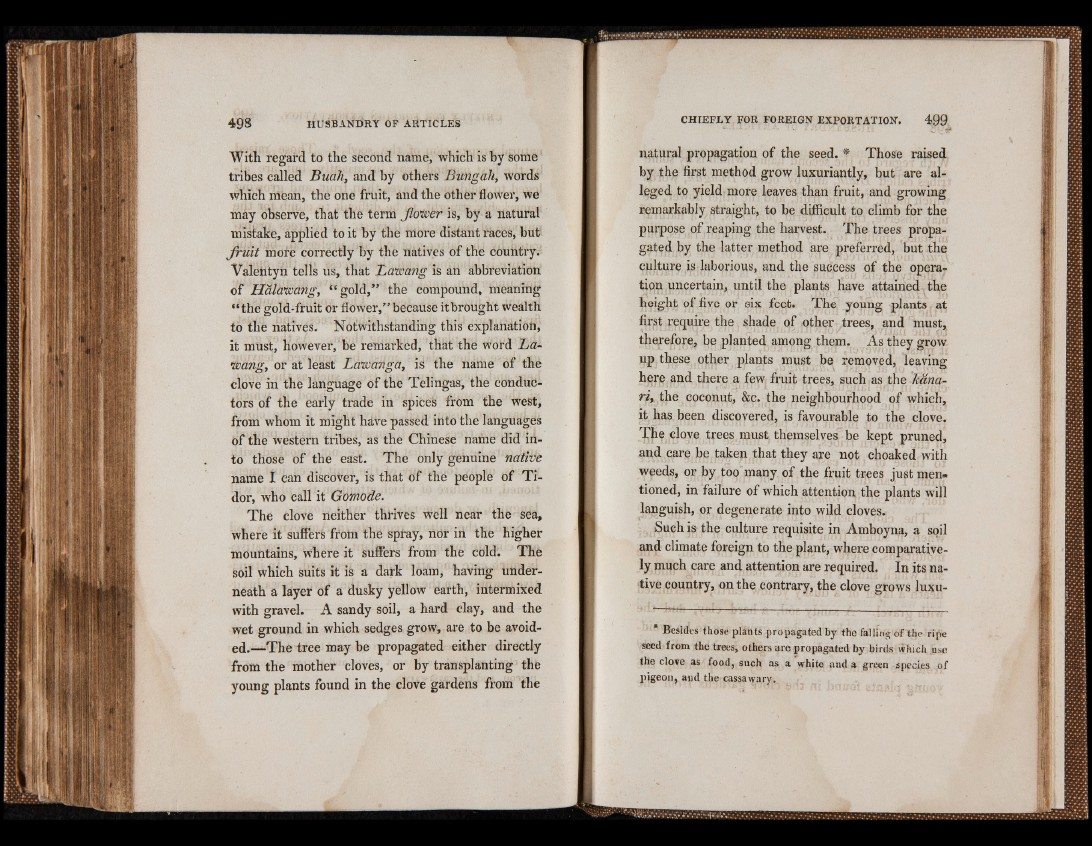
With regard to the second name, which is by some
tribes called Buah, and by others Bung ah, words
which mean, the one fruit, and the other flower, we
may observe, that the term jlawer is, by a natural
mistake, applied to it by the more distant races, but
jr u it mote correctly by the natives of thé country.'
Valentyn tells us, that Lawang is an abbreviation
of Hâtàivang, “ gold,” the compound, meaning
“ the gold-fruit or flower,” because it brought wealth
to the natives. Notwithstanding this explanation,
it must, however, be remarked, that the word La-
Wang, or at least Ltiwanga, is the name of the
clove in the language of the Telingas, the conductors
of the early trade in spices from the west,
from whom it might have passed into the languages
of the western tribes, as the Chinese name did into
those of the east. The only genuine native
name X can discover, is that of thé people of Ti-
dor, who call it Gornode.
The clove neither thrives Well near the sëâ,
where it suffers from the spray, nOr in the higher
mountains, Where it suffers from the cold. The
soil which suits it is a dark loam, having underneath
a layer of a dusky yellow earth, intermixed
with gravel. A sandy soil, a hard clay, and the
wet ground in which sedges grow, are to be avoided.—
The tree may be propagated either directly
from the mother cloves, or by transplanting the
young plants found in the clove gardens from the
natural propagation of the seed. * Those raised
by the first method grow luxuriantly, but are alleged
to yield more leaves than fruit, and growing
remarkably straight, to be difficult to climb for the
purpose of reaping the harvest. The trees propagated
by the latter method are preferred, but the
culture is laborious, and the success of the operation
uncertain, until the plants have attained the
height of five or six feet. The young plants at
first require the shade of other trees, and must,
therefore, be planted among them. As they grow
up these other plants must be removed, leaving
here, and there a few fruit trees, such as the Mna-
ri, the coconut, &c. the neighbourhood of which,
it has been discovered, is favourable to the clove.
The clove trees must themselves be kept pruned,
and care be taken that they are not choaked with
weeds, or by too many of the fruit trees just mentioned,
in failure of which attention the plants will
languish, or degenerate into wild cloves.
Such is the culture requisite in Amboyna, a soil
and climate foreign to the plant, where comparatively
much care and attention are required. In its native
country, on the contrary, the clove grows luxu*
Besides those plants propagated by the falling of the ripe
seed from the trees, others are propagated by birds which use
the clove as food, such as a white and a green species of
pigeon, and the cassawary.